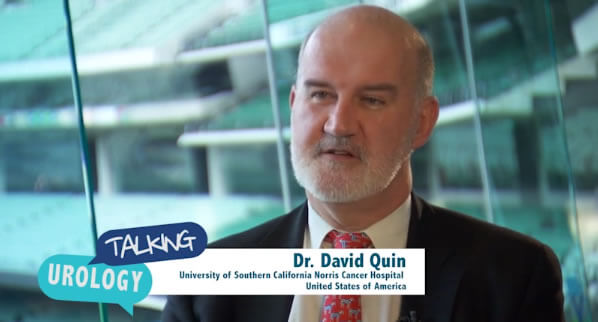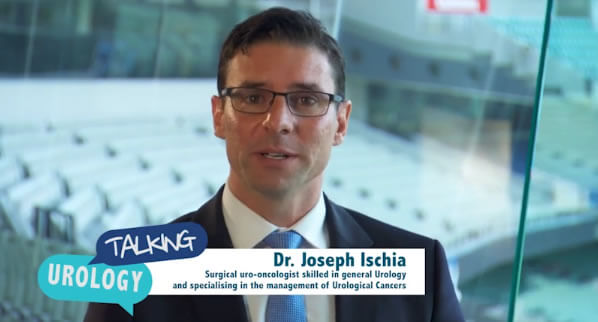ANZUP 2018 – A/Prof Angie Smith
Assistant Prof Angie Smith discusses the four types of BCG failure and subsequent management in patients with non-muscle invasive bladder cancer.
Talking Urology Podcast Transcript
ANZUP 2018 Interviews – Angie Smith
Joseph Ischia: Hi Angie! Thanks for joining us on Talking Urology. You gave a fantastic talk today on BCG refractory disease. Would you like to go through some of the key highlights?
Angie Smith: Sure, so BCG refractory disease, as a urologist who treats bladder cancer exclusively, I think is one of our biggest challenges. We don’t have a lot of understanding of what to do and when to do it. So, really what I highlighted at this talk was number one, the importance of having a consensus definition for what truly is BCG refractory disease, and then I went into some of the different treatments we have currently based on data including intravesical chemotherapy, immunotherapy and also chemoradiation even though we don’t standardly think about that and then cystectomy.
Joseph: Correct. Let’s go back to what you described as the alphabet soup of definitions for BCG response. Can you run through those first?
Angie: Yes. It can get quite confusing, so I thought it was important to highlight these definitions. Ashish Kamat published a great paper in JCO that highlighted these four definitions. It is really critical to understand them. BCG intolerance, that is essentially comprised of patients who did not tolerate BCG for one reason or another, often it is side effects. I feel like those number of patients are getting fewer and fewer, and that is not truly BCG refractory disease. What is, are those patients who undergo BCG but have recurrence within six months, having had two induction courses or at least one induction course with maintenance. There is another category called BCG relapsing disease. Now, these patients have disease-free status after they have BCG, but then they recur at six months or later. In my mind, BCG relapsing disease there is what I would consider early relapsing and late relapsing, and so there is a fourth category called BCG unresponsive, and that is also an important category because essentially the risk is similar for BCG— this category contains BCG refractory or BCG relapsing early right at six months, and so both of those categories and that is the importance of BCG unresponsive disease. This is the category of patients that we are really concerned about with regard to progression, and that is the crux of the matter, when do we do cystectomy? Right?
Joseph: Absolutely. So, let’s go onto the intravesical treatments on the horizon. Which ones do you think is the most promising? For BCG refractory diseases.
Angie: Yes, absolutely. You know, we’ve seen studies in intravesical chemotherapy and we have seen studies with BCG Interferon, but I think on the horizon right now are the studies looking at checkpoint inhibitors. I consider it a resurgence of immunotherapy because BCG has been around since the ‘70s but what happens when people don’t respond, and so there are a bunch of trials on the horizon. The S1602 trial with, this is Rob Svatek’s trial looking at priming, so the patient gets essentially intradermal priming and then you look if the BCG responds after that. There is also immune checkpoint inhibitors, so the 1605 trial with Peter Black looking at— essentially Atezolizumab, there is the keynote 57 at Pembro and I think those trials are going to answer an important question as whether checkpoint inhibition which, you know, we’re building from the success in advanced urothelial cancer is actually applicable to BCG refractory disease because what we’re trying to do is have bladder conserving therapy for these patients and I don’t feel like we have enough tools right now and I’m hoping that opens up the options, and I think we will also probably see combination therapy with immunotherapy but also intravesical gemcitabine, so maybe intravesical chemotherapy agents along with checkpoint inhibitors, and I think that is likely on the horizon.
Joseph: Fantastic. When do we need to do a cystectomy?
Angie: Yes. So, that is the million-dollar question, right? And that is the question that we face as urologists but also as patients. It is a very patient-preference driven type of question. I think that based on the data we have with regard to timing of cystectomy I think we have some time to try salvage therapies. I think considering clinical trials in this setting are appropriate because we have a lot at our disposal as of right now, but I think that you have to be very careful with these patients. You have to be surveying them carefully and you have to expeditiously move to cystectomy when the time comes.
Joseph: And that surveying them carefully, is that the three-monthly cystoscopy or is that not?
Angie: No, that is absolutely right. Three months cystoscopy, there are really no exceptions to that.
Joseph: Excellent. And the final question: What is one thing that urologists are doing poorly when it comes to BCG treatment or refractory disease?
Angie: Yes. Great question.
Joseph: What is the common mistake we make?
Angie: Yes. I would say, I get a lot of referrals for BCG refractory disease in my practice, and I would say that the biggest mistake that I see is the belief that BCG is going to work again. Now, I agree that if they have had one induction you need to give them the second induction up to 50%, if sometimes higher will respond, but when you get to the third BCG induction, so this is truly BCG refractory disease, the response rate plummets to 20%. It is very low and the progression rate actually goes way up to 80%, so these are the patients we have to be very careful about. BCG is not going to work for these patients, very unlikely to work so if you’re going to do anything and you want to avoid cystectomy you have to do something else, chemotherapy, perhaps one of these clinical trials with checkpoint inhibitors, etc.
Joseph: And a question that otherwise comes up in our MDTs is the patient had a BCG induction two years ago or three years ago, when does the clock reset used? You just go, let’s just start again and do the two inductions.
Angie: Fantastic question. I think that is an important question and I didn’t actually address that in the talk in 20 minutes, but in my mind and based on the evidence we have, it’s at 12 months. If I see a recurrence after 12 months from their original induction, I treat them as if they hadn’t had BCG again because they respond quite well, which is great. So those are the easy patients. I go right to BCG and oftentimes they will respond.
Joseph: Angie, thank you so much for coming all the way to Australia.
Angie: It’s a pleasure.
Joseph: It was really a pleasure, we appreciate it and you have been a wonderful speaker.
Angie: Thank you












